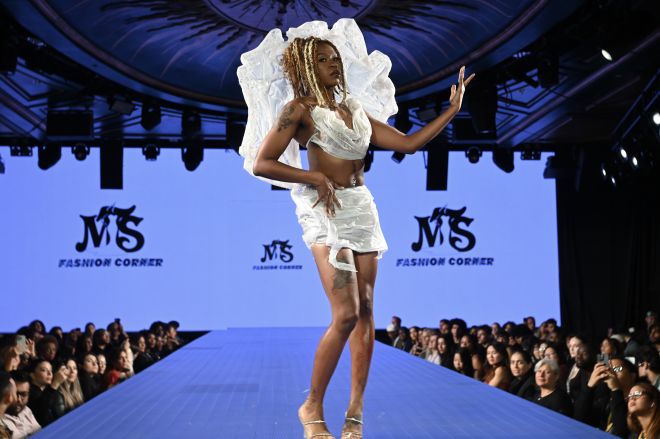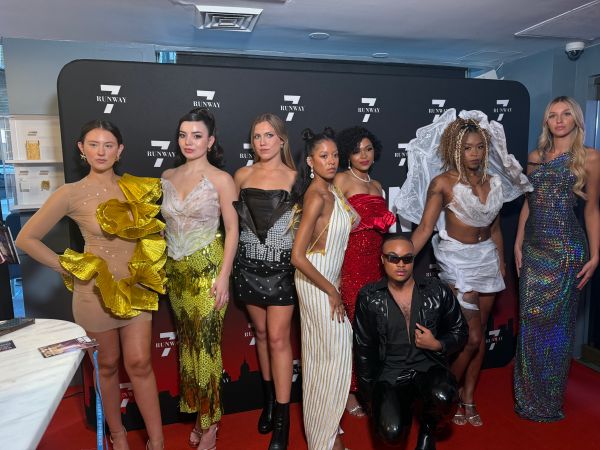Social Media Boutique Or Scam?
NYFW Designer Patricke Benbow Exposes The Red Flags Of Fake Online Boutiques — And How To Protect Yourself [Exclusive]
Share the post
Share this link via
Or copy link

From TikTok boutiques to Instagram storefronts, shopping for fashion on social media has become second nature for many shoppers.
While some online shops offer unique, up-and-coming designs, others are little more than scam hot spots hiding behind photos and inflated follower counts.
Patricke Benbow, the self-taught designer behind MTS Fashion Corner, knows this struggle firsthand.
RELATED CONTENT: Covered, Not Silenced — Muslim NYFW Designer A’iShah El’Shabazz Dismantles 5 Myths About Modesty [Exclusive]

Her label, MTS Fashion Corner, is rooted in the beauty of silhouettes and detail.
The avant-garde collection she debuted at New York Fashion Week, included sculptural touches, intricate fabric work, and pieces that felt more like art than fast fashion.
She’s using her platform to help shoppers sharpen their eye and spot the difference between a legitimate boutique and a digital con artist.
Red Flags To Watch For Social Media Boutiques

Source: Jabbar Photos / other
Social media shops can look polished at first glance, but that doesn’t mean they’re the real deal.
Love MadameNoire? Get more! Join the MadameNoire Newsletter
We care about your data. See our privacy policy.
Benbow, 30, says the first step in vetting an online boutique is reviewing the overall social presence: consistent posting, authentic engagement with followers, and the quality of their images.
Still, numbers can be deceiving. “Sometimes engagement doesn’t really prove as much,” Benbow told MadameNoire. “You can be soaring in your business as a boutique and the engagement on social media is not matching what your progress is.”
That’s why she recommends digging deeper. Sending a DM or email and reviewing the response can help confirm whether the brand is legitimate or a scam.
“If you have your third eye open, you can really guess—and trust yourself,” she added.
Beware Of Stolen Or Fake Content

Source: Jabbar Photos / other
Another common scam tactic is stolen content. Some pages repost other designers’ work or even use AI-generated photos to pass off as original designs.
“When it comes to designers, you can tell if they’re posting other people’s work versus theirs,” Benbow explained. “Catching those details and realizing, ‘I think I’ve seen this photo before,’’ she said, is key.
Duplicate accounts are another red flag. Scammers often mimic well-known boutiques with nearly identical names and recycled imagery.
“If you see a page that looks so familiar towards its name, or there’s something in it, you can compare that to the other page and you might see similar work,” Benbow said.
Benbow’s Battle With Copycats

Source: Jabbar Photos / other
Even legitimate designers aren’t safe from forgery. Earlier in her career, Benbow discovered that someone was imitating her work and selling it through AliExpress.
Fortunately, her one-of-a-kind approach made it easy to spot the impostors.
“Nobody else can really duplicate what I already put out,” she said. “I only do one-of-a-kind pieces, so if you see another one, it’s not me.”
Benbow emphasizes that shoppers should know the brand they’re buying from if they want authentic designs instead of knockoffs.
Why A Boutique Is Worth Supporting

Source: Jabbar Photos / other
Not every social media boutique is a scam. Many small designers rely on these platforms to grow their brands and connect directly with consumers who crave something fresh.
For Benbow, spotting and supporting legitimate talent comes down to staying observant.
“Nowadays, to be scammed, you really [have] to just be nonchalant, to be honest, because it’s right in front of your face,” she added. “You just have to use your keen eye.”

Source: Jabbar Photos / other
Benbow admires the evolution of fashion and how it constantly repeats itself. She explained how shopping smart means not buying with trends in mind—because what’s hot now will eventually fade.
Instead, she encourages consumers to shop with vision, which helps keep personal style feeling timeless.
“In this industry that we’re in, it’s all inspiration in my views,” she said.

Source: Jabbar Photos / other
Social media has made fashion more accessible than ever, but consumers need to protect themselves from scams posing as boutiques.
With a detail-oriented eye, a quick DM, and a little trust in your instincts, you can separate the frauds from the future stars of fashion.
RELATED CONTENT: The Lost Art of Sewing: Jacquelyne Bailey’s NYFW Debut Inspires Us to Pick Up a Needle [Exclusive]
-

My Husband And I Attempted To Have A Creative Date Night At Home -Without A Babysitter - Here's How It Went
-

Our Health, Our Power: Debunking Myths And Taking Charge This Open Enrollment
-

Dear Christians, Your Reaction To Dr. Karri Bryant's Dress Is Partly Why People Don’t Do Church [Op-Ed]
-

8 Famous Lesbian Women Who Were Married To Men



